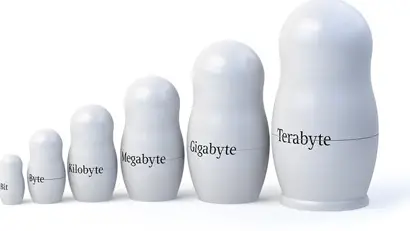Computer memory is measured in both bits and bytes, they are just different units of measurements.
A bit is the smallest amount of memory a computer can hold, and it can be only one of two values: 0 or 1. While a bit in itself can hold very little data, bits are strung together in larger chunks that can hold more useful information. Bit strings form binary code, a succession of 0s and 1s which form the language readable by computers.
Eight bits make up a byte. Whilst a bit can only be either 0 or 1, a byte can represent a value between 0 and 255.
1024 bytes make up a kilobyte, and 1024 kilobytes make up a megabyte.
You will be familiar with megabytes (mb) as they are used commonly as a measurement in modern computing. For example, internet speeds may be described as "17mbps" download speed. This means that the connection can download 17mbs of data in one second. To put that in perspective, 17mbs equates to about 3-5 mp3 music files.
